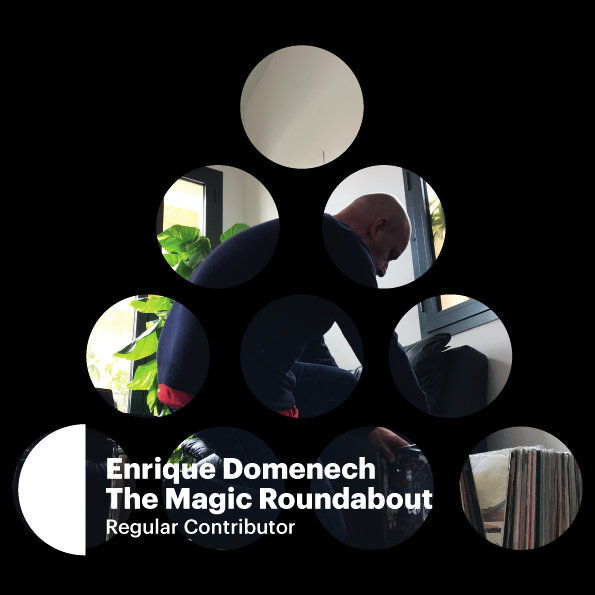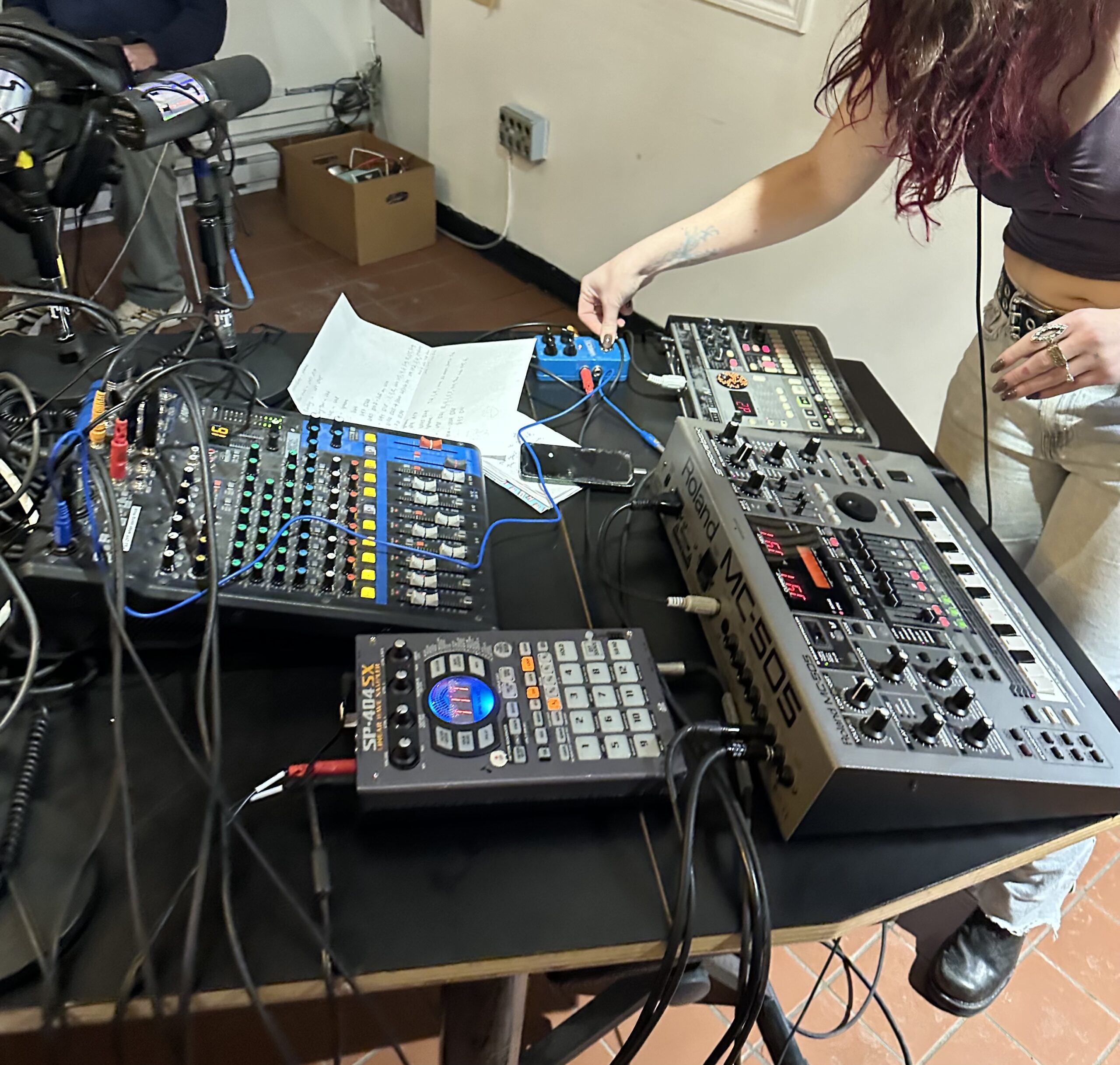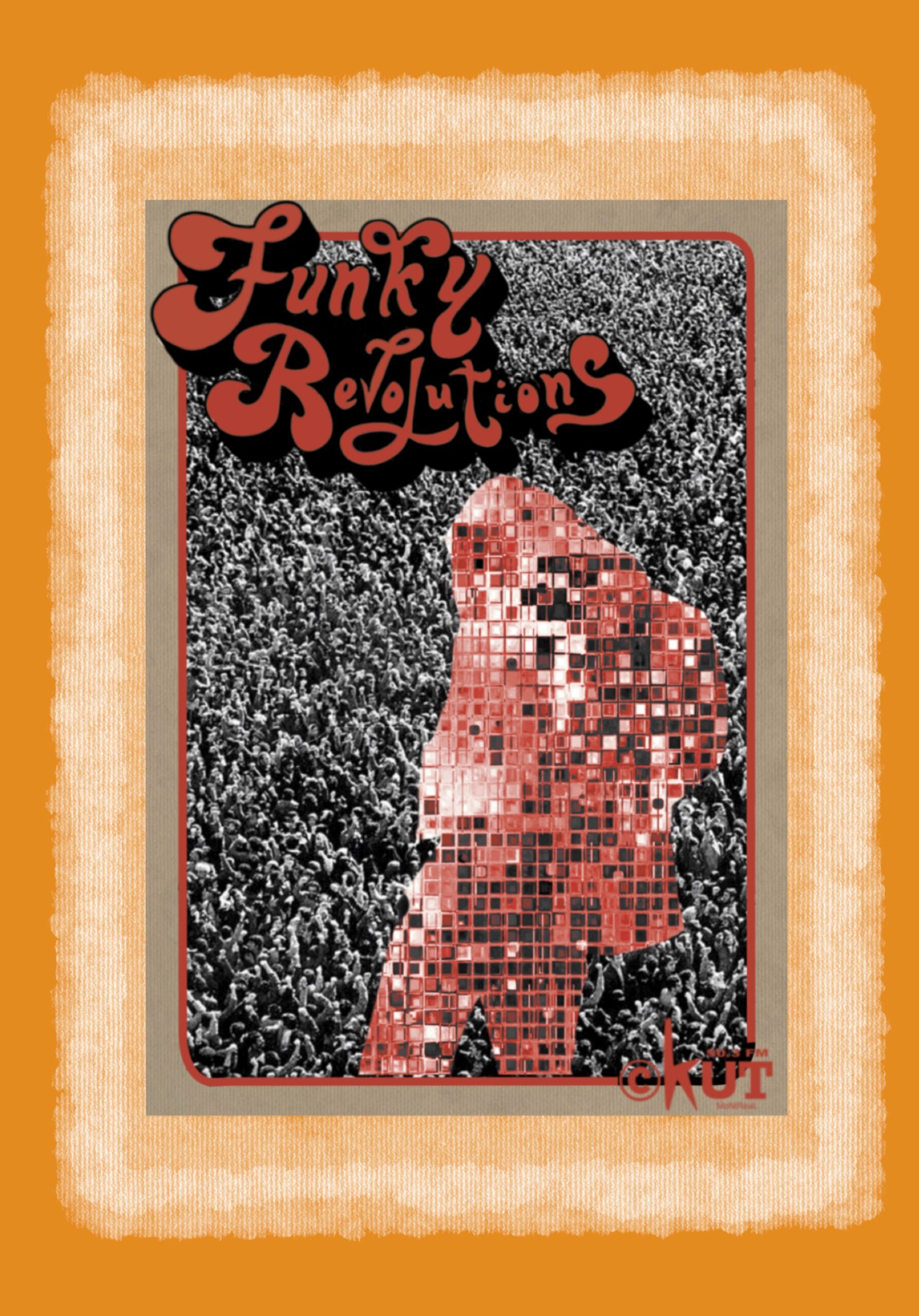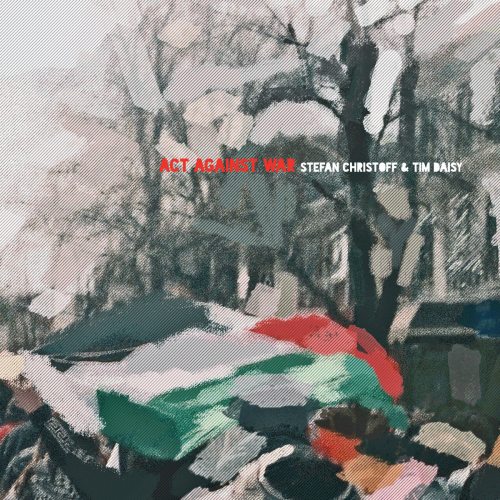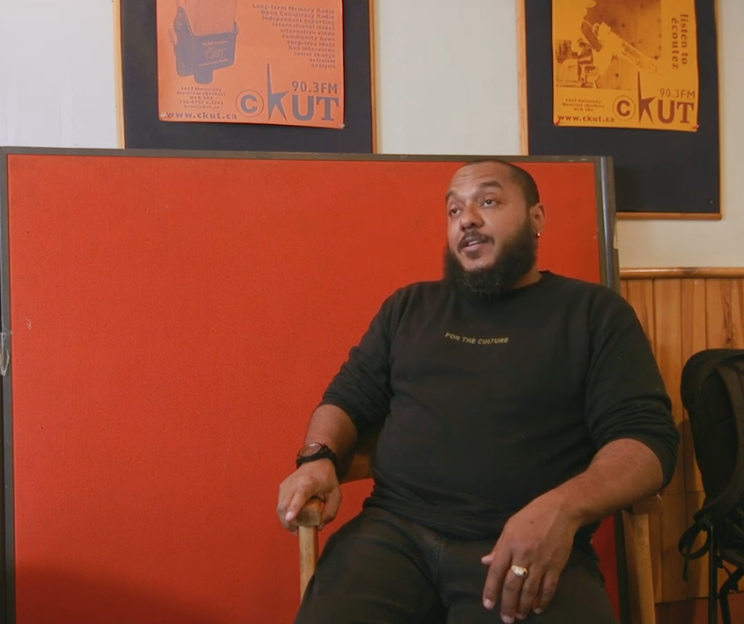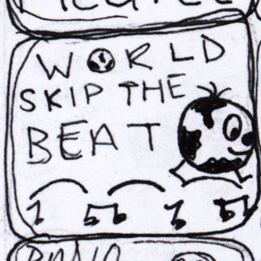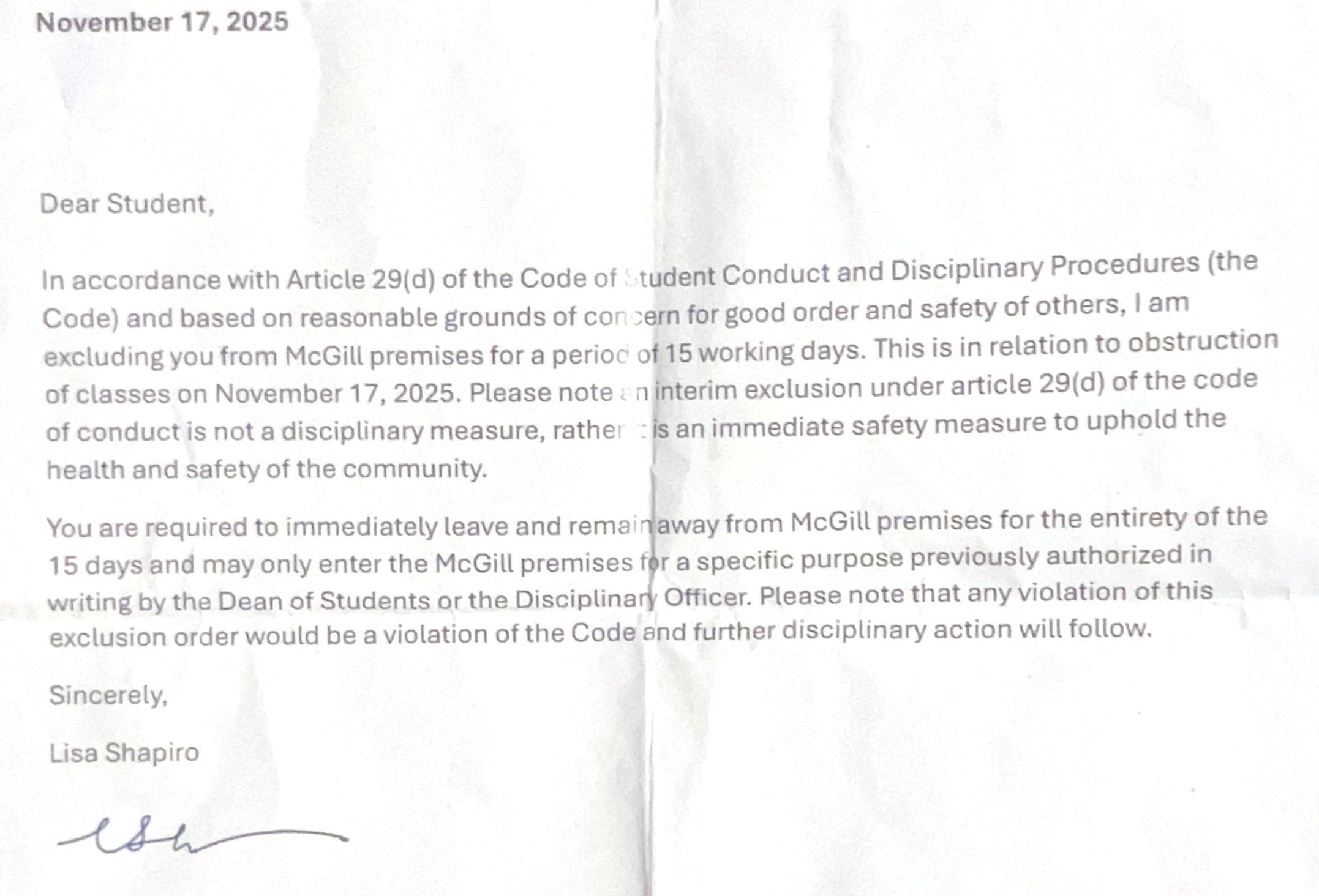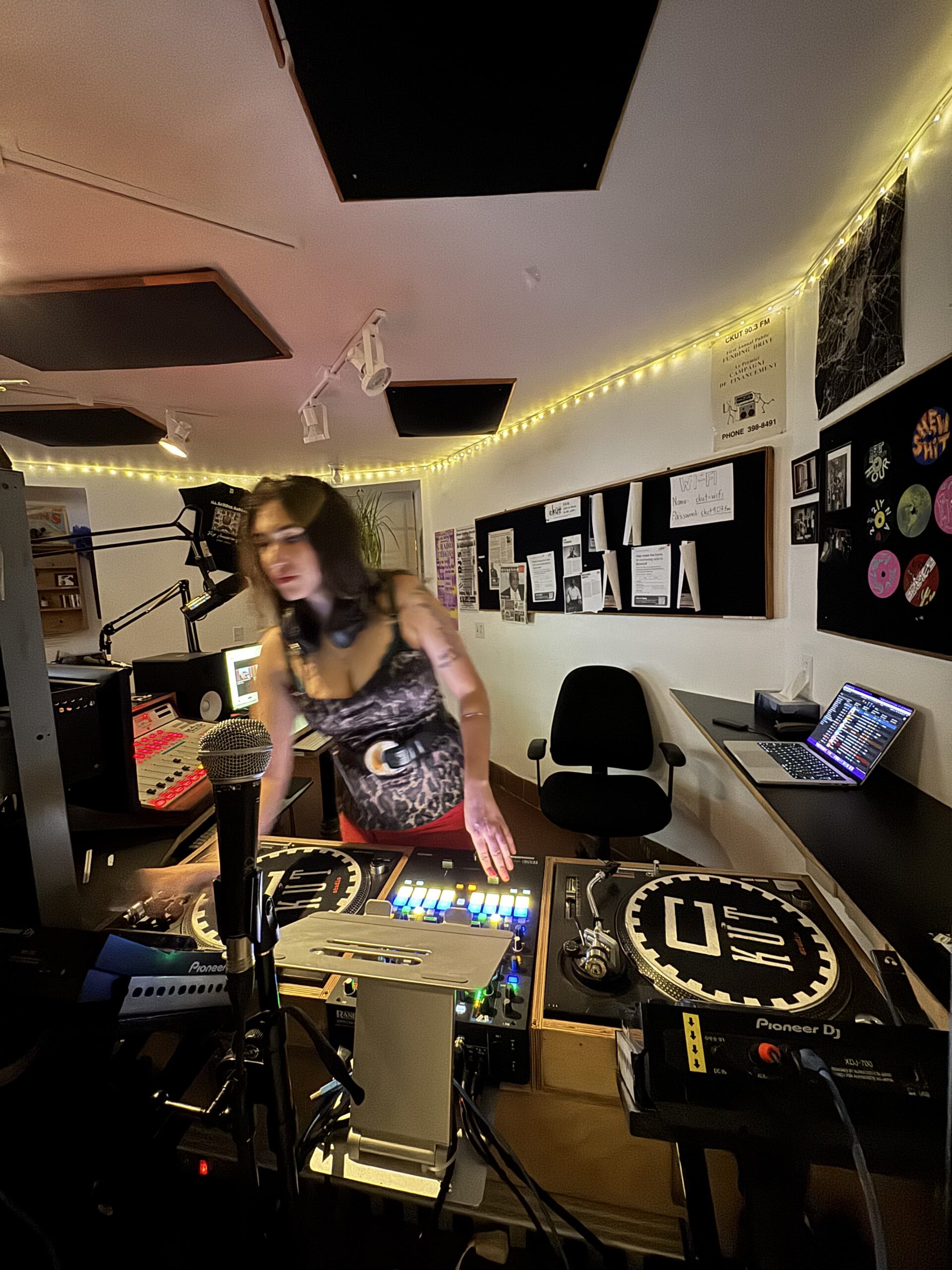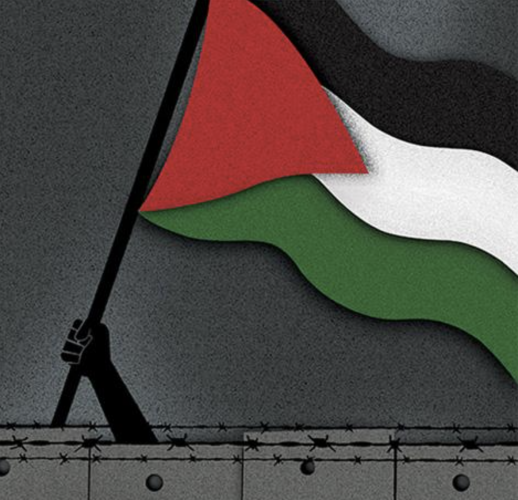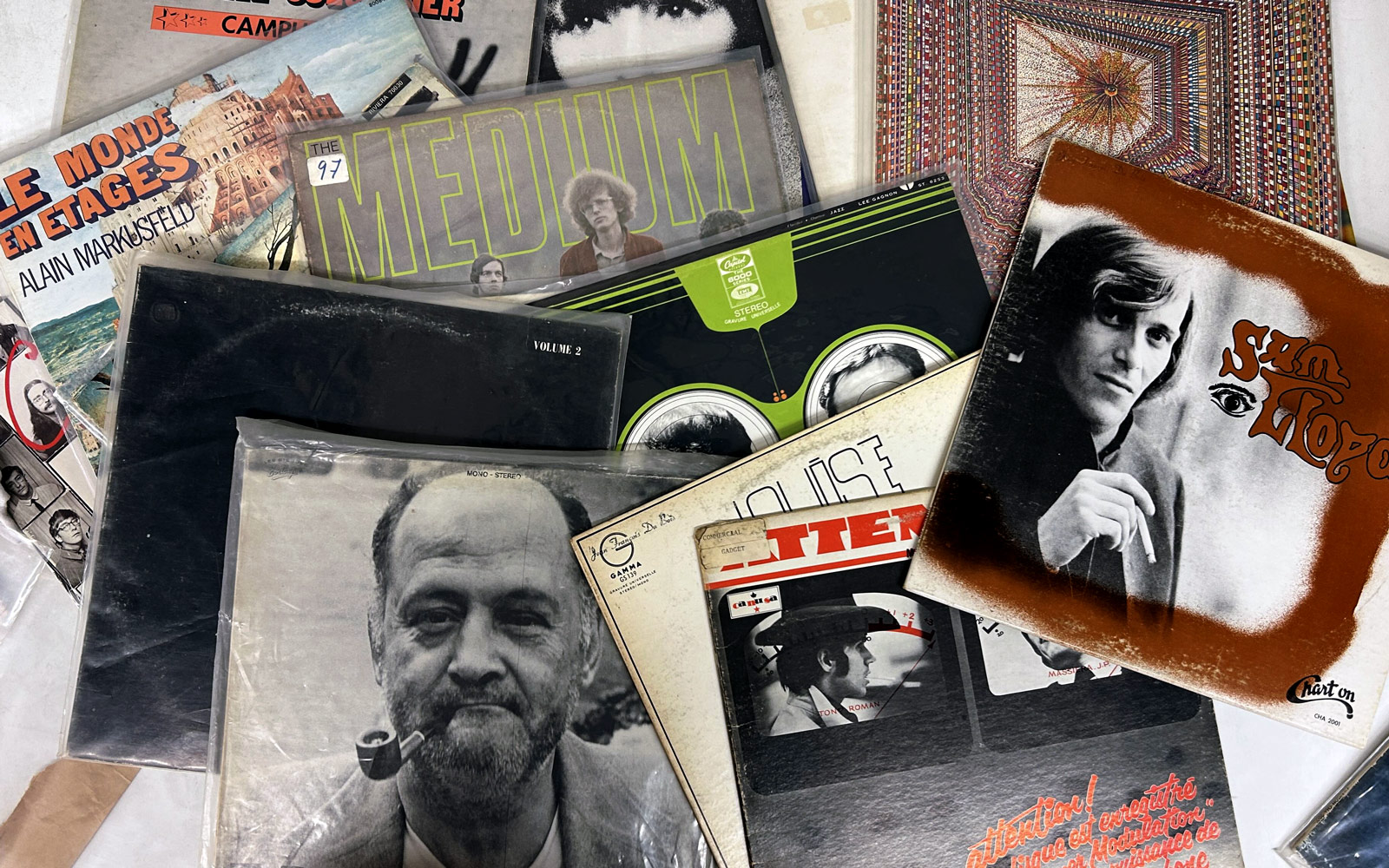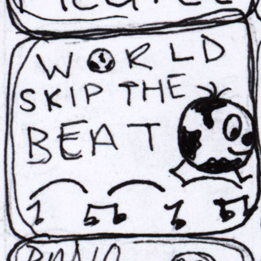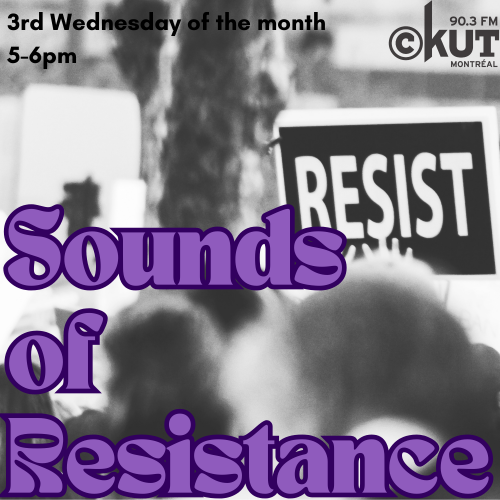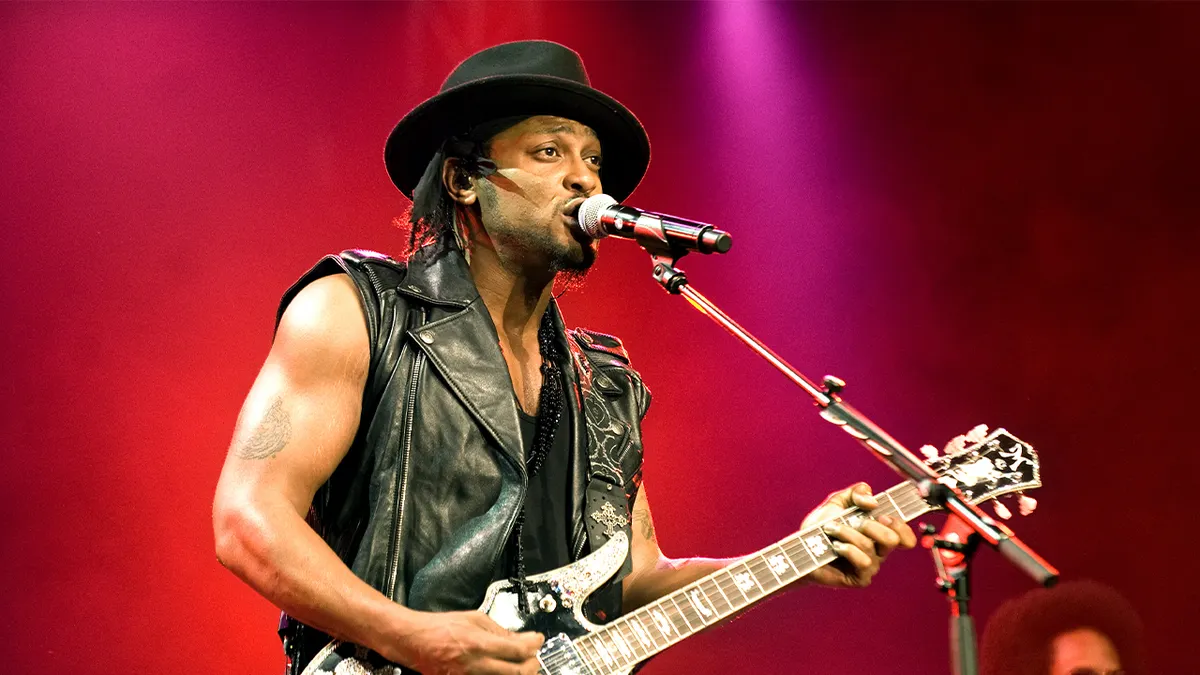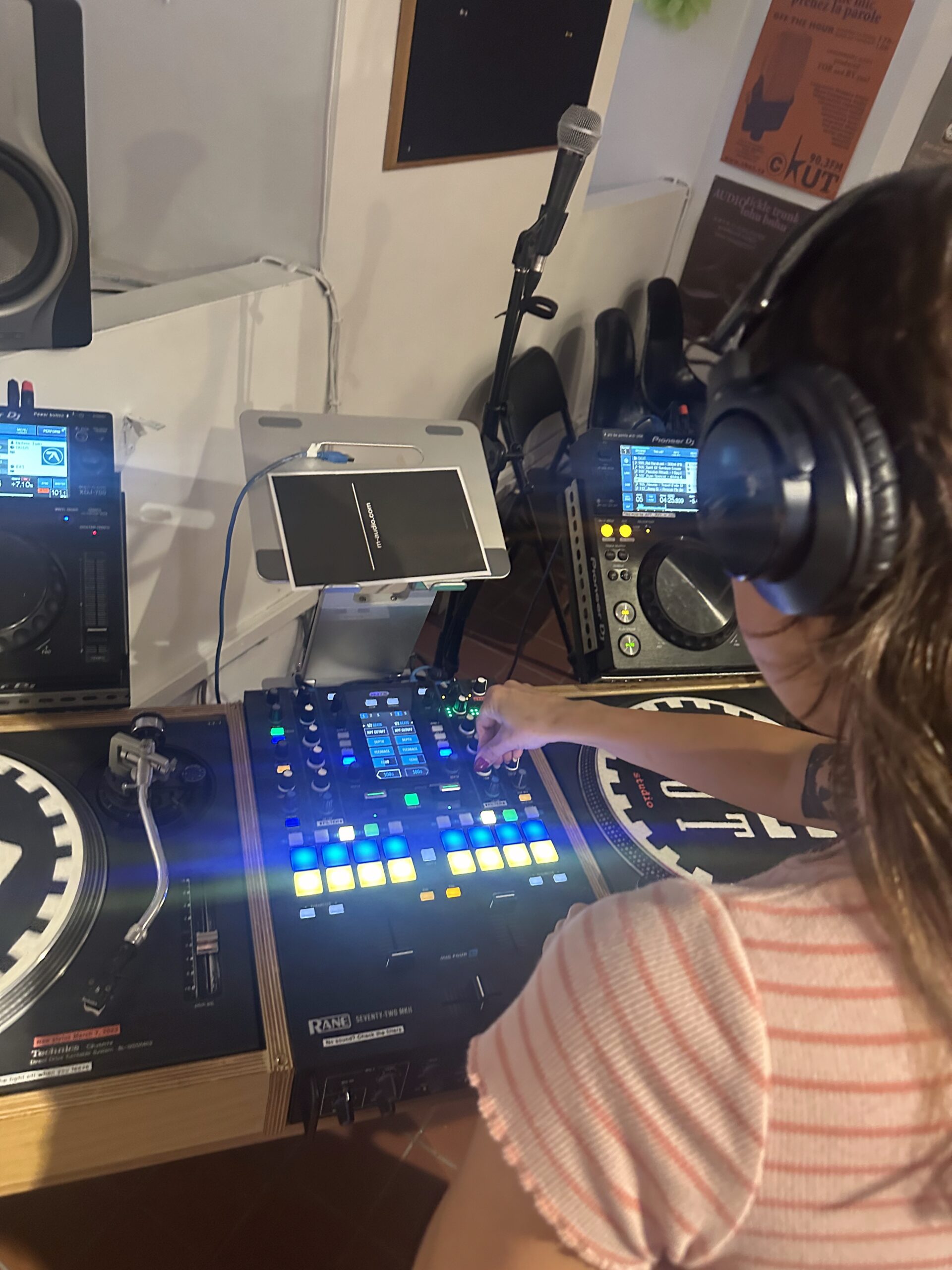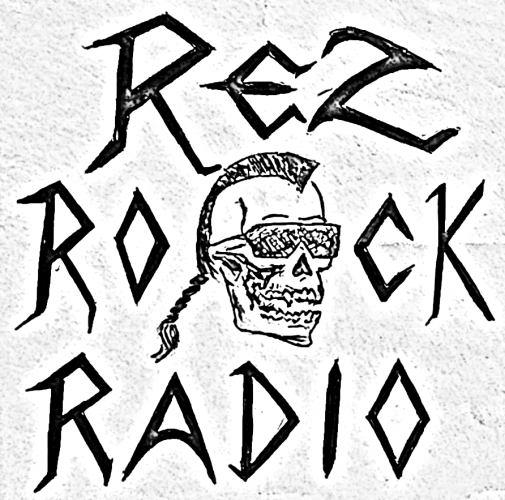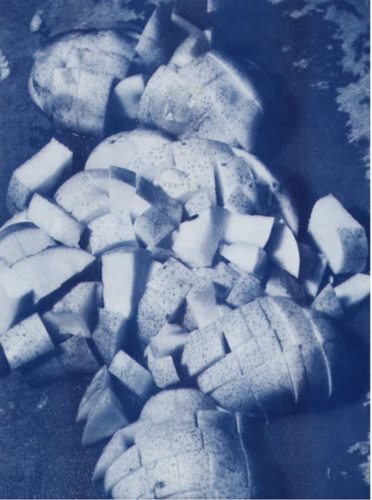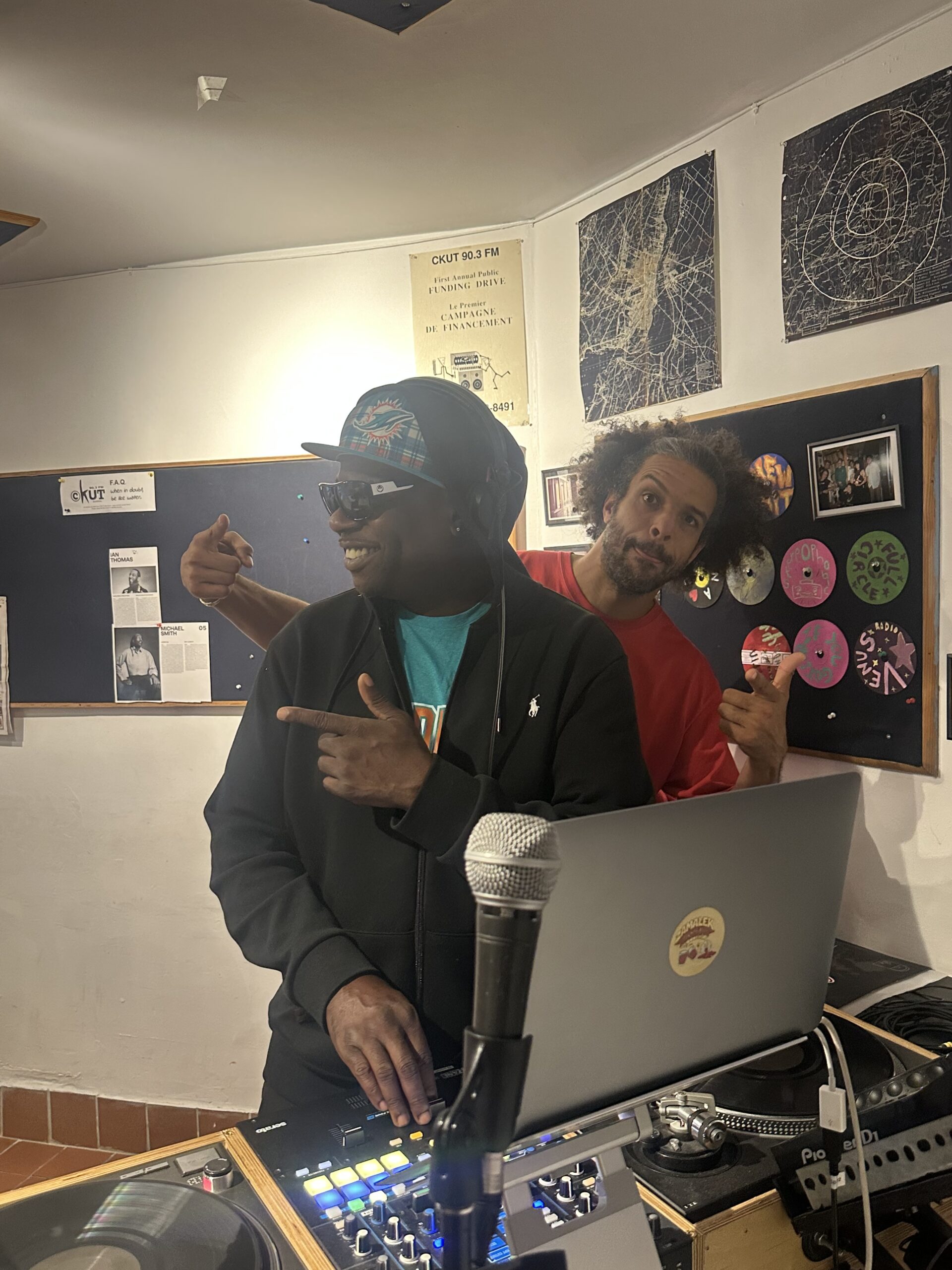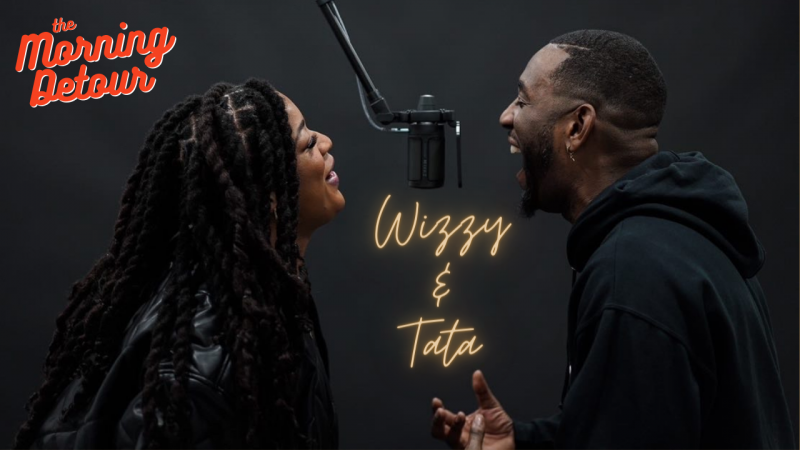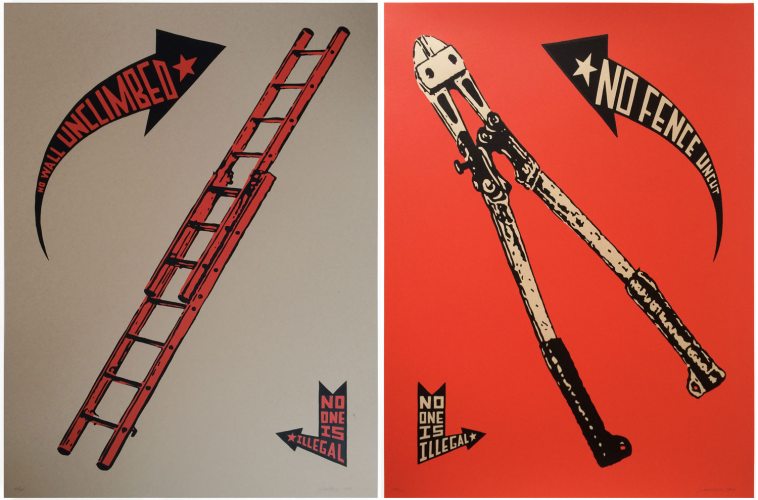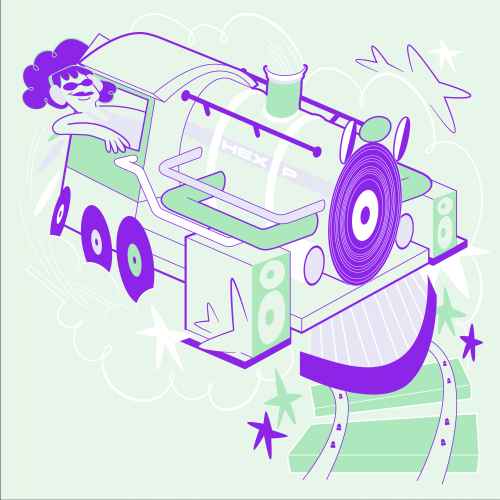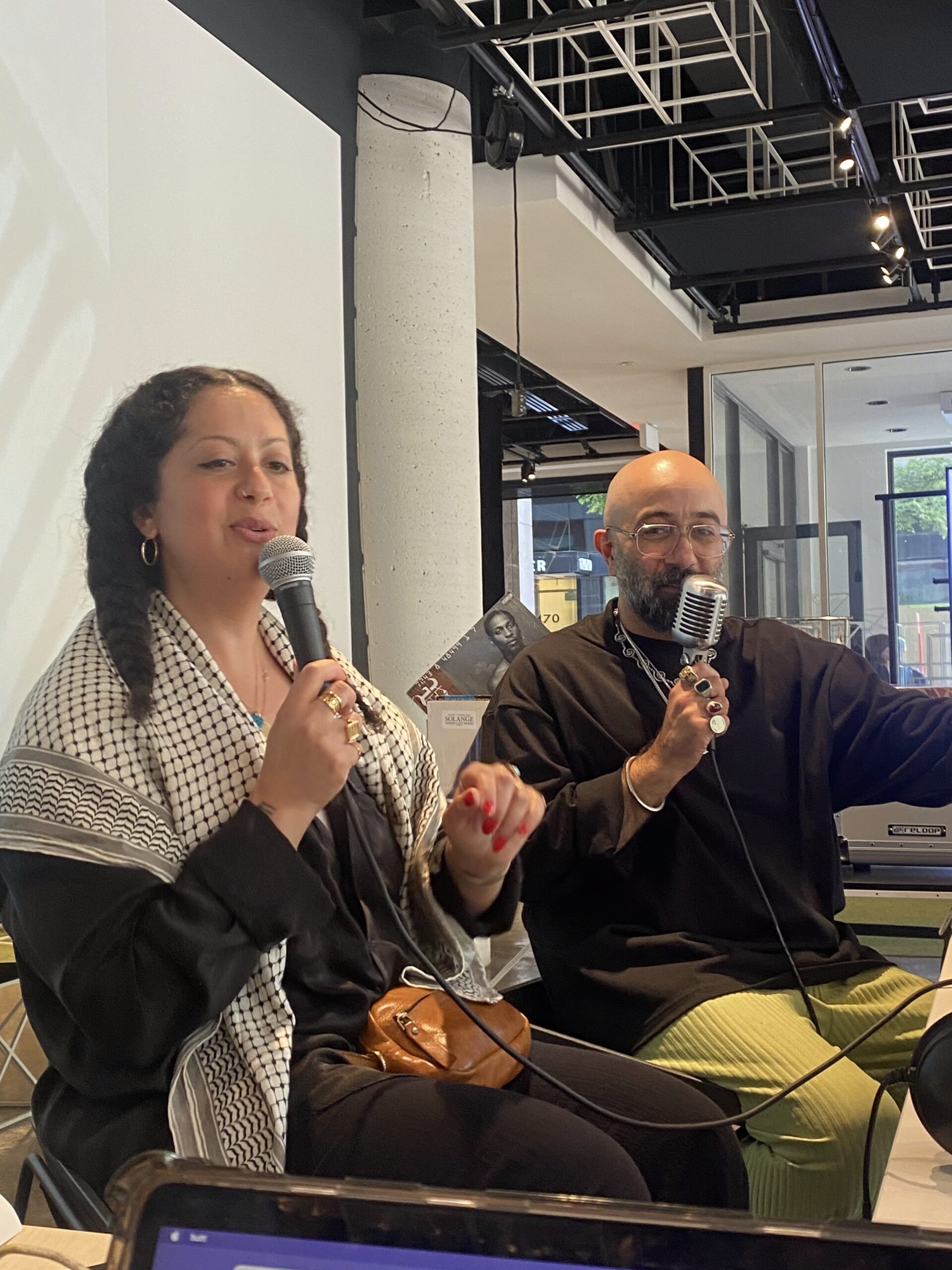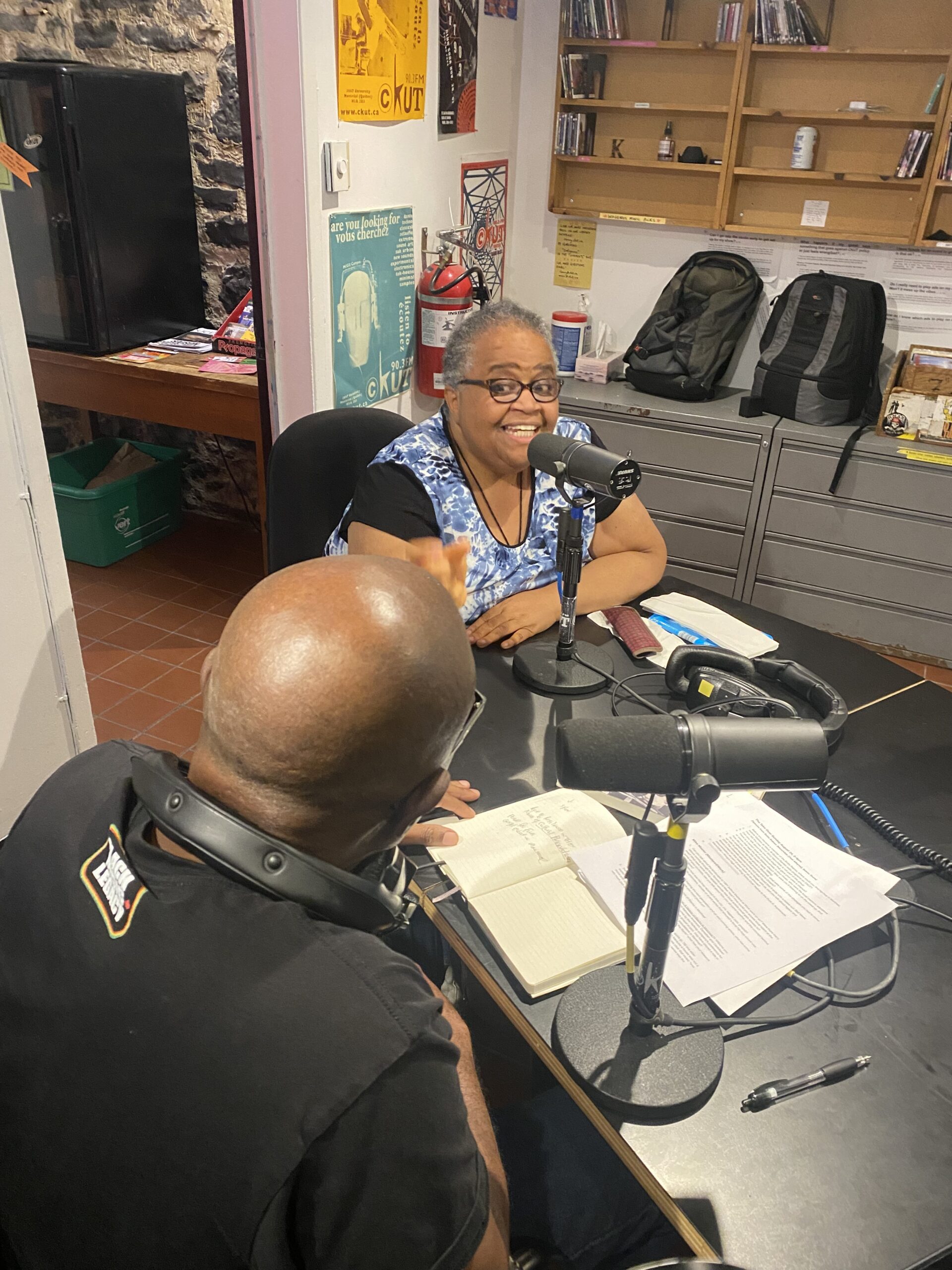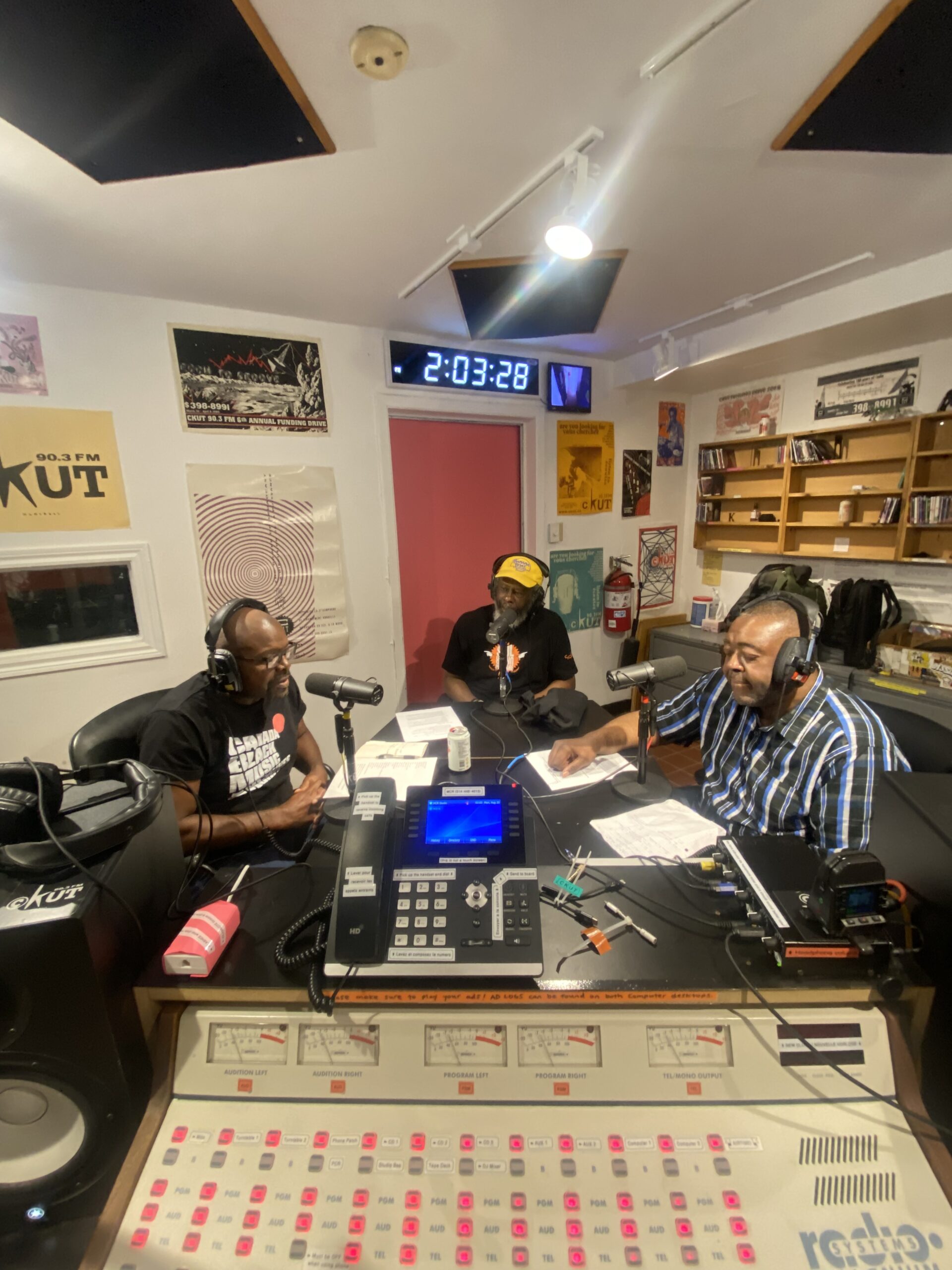Oral History with CKUT Host Samaa Elibyari
An interview with Samaa Elibyari, member of the Canadian Council of Muslim Women and host of Caravan on CKUT.
CKUT Arts & Culture Coordinator, Tamara Filyavich, spoke with Samaa (the week after Trump announced the move of the U.S. embassy from Tel Aviv to Jerusalem) about covering issues affecting the Muslim community for over 20 years. She began with the radio show, Crossroads with Ehab Loteyef in 1997 while she was working at the Islamic Center. Then started the radio show Caravan.
She recalls being on the air the day after 9-11 and how this event focused and galvanized her objectives for the show. She was/is alarmed at how reductive the mainstream reporting of this event was and felt it important to talk about the effects of the sanctions in Iraq, the bias in U.S. policy towards Palestinians and the other issues that motivate young men to such extreme behavoir. She used her voice as a programmer at CKUT to counterbalance the bias against muslims which she sees as a “downward spiral against Muslims” both in the U.S and in Quebec.
The interview, conducted by Tamara Filyavich, CKUT’s Arts & Culture Coordinator at time, is transcribed below.
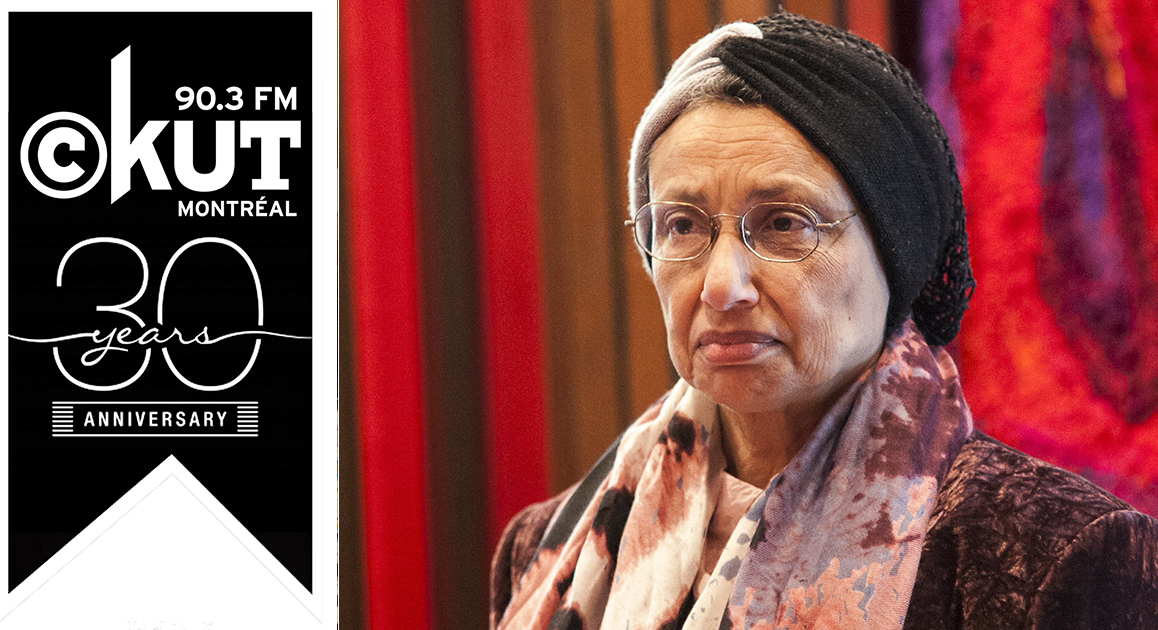
So how did your love for radio start? Where’s this all coming from to begin with?
It started when I was very young. Remember, as a pre-teen, we didn’t have TV in Egypt. So radio was the main entertainment part. And I loved to listen to the news and I loved to listen to the songs. And I remember in the sixties, the first transistor radio that my father bought because there weren’t many in Egypt. So he was abroad and he bought this transistor.
And I remember it. It had a red cover and it was quite heavy, but I could carry it around with me and take it and listen to it. So I eventually appropriated the radio and I would listen to the news on BBC. And of course at that time the mainstream media – the Egyptian media – was not free, so we didn’t get the news.
So we had to really listen to alternative sources. And I would listen to the BBC in Arabic, and they had an excellent program and they were saying things that the government was not saying. And I would rush to my father and say, Did you listen to the latest news? So I was very happy about that. I had an interest in politics since I was really very young and it’s only in the late 1960s that we got TV in Egypt.
I didn’t like it as much as radio. We had all those Emirati and Syrians, but they were not authentically Egyptian and they were not French because I used to go to a French school. So it was on the radio that I listened to French songs. So radio is very important to me and even in Egypt as an oral tradition.
Narration is very important. We all know about the Arabian Nights and actually there was a series called The Arabian Nights and I used to listen to it avidly and stay up late at night to get the first edition of the series. So all of this, I think I always had a love for radio and a love for reading for oral tradition.
Interestingly, I found at one point a report from my kindergarten years, and in this report I must have been around five or six and the teacher mentioned that I loved reading and this stayed with me throughout. I didn’t find it recently, but I found it. Let’s say many, many years, maybe 40 years later. And actually this report was at home.
And once I was visiting and they told me, well, we found this report and I kept it in my archives. I don’t know what to do with it, but simply it’s to show that I had this disposition. And it’s I still love to read and I still love to read aloud and I still love to listen to stories.
Well, let’s make a radio play about you. That that sounds amazing. Okay. So how how did you discover CKUT? What was your first exposure to it? And why did you choose to come and make radio here?
I actually it was just by accident and they had started a radio program for the Muslim community at CKUT and it was during Ramadan. And you have Ehab (Lotayef), who was one of the founders of the first radio for the Muslim community. He said, Why don’t you come? We’ll have an interview with you and you will talk about your recollections of Ramadan as it was in Egypt.
So I came for the interview. I can’t say whether it was good or bad. I just talked about how I felt. Ramadan here in Montreal, and my recollection of Ramadan in Egypt. And I listened to the show. And afterwards I said to her and the other organizers, you know, we could have done this. We could have said that… So they told me, well, you want to do something, come and do it. Don’t tell us what to do. So I took him up on his offer and I came and I did the first interview and I remember it was so bad. I mean, every few minutes I would say, let’s take a break.
I mean, it’s a very professional thing to do when you feel like an interview is not going well. So why do you feel it wasn’t very good? You have a hard time imagining it.
Well, it was. I’ve never read your training. I had never interviewed someone, and I remember the subject perfectly. It was about Palestine. So I don’t know. I thought that when I listened to radio, it was always, “Let’s have a break.” “Let’s have an ad.” – So I thought this was the thing to do. And then later I realized I was doing it too frequently.
So when when was this? What year are we in? And what was the show called?
The show was called Crossroads, and it was in 1997. I remembered this. So I was participating in the show, but it was not my show. I was one among four other people who were doing the show and a couple a year later, the others, most of them were students. They left the room.
They couldn’t continue with the program for one reason or the other. One of them moved out of town. The other graduated. So I was left alone and we didn’t know what to do with the show. So I said, okay, well, I’ll take it on for a while to find others to work to contribute to the show. And this was in 1999 approximately. And I didn’t. So I said, okay, I am trying my best. So I carried on for a year and during this year I didn’t know what to present. I mean, it was a big burden. I wouldn’t say it’s a burden, I’m sorry, but a big responsibility because it was one hour every week and I was working also at that time.
So I never had to think about what to present. And this is essentially it. I didn’t know what a Muslim radio show would be. What would be of interest? Why would you listen to such a program? So I think I was going in all directions. What helped me a bit with the interviews is that I was working in an Islamic center at the time, so I was very much in touch with the community. I knew what the problems were, I knew what the concerns were. I used to meet several people, so I asked them to come for interviews. So I carried on, but I wasn’t too sure of what would really be unique to a show. And this is what you have to find when you are presenting a show. What makes it interesting to the public?
What’s going to be so unique about it? Why would they listen to you rather than the CBC? And there’s so many challenges for community radio that you really have to have it be very special to gain the attention of listeners.
So what were the concerns for the community when you first started doing the show and how did you zero in on things that would be of interest.
Essentially at that time Muslims here in Montreal were concerned the people still didn’t know about us. I mean, who are the Muslims? What are they doing? And my job was to talk about not not preaching because here it’s not a religious show. And I wouldn’t even feel capable of talking academically about it, but I would talk about the traditions I would try to inform, and I would also try to invite people in the community who have succeeded.
And we also talked a lot about international politics because this was of concern to the community here. We’re first generation and our homes in our previous countries were never far from our minds and hearts. And at that time, it was only the question of Palestine that I covered extensively. It’s enough to be of interest. But still there weren’t so many Muslims around who would come to do radio, especially because we are not accustomed to being in the media. So people were shy about coming and talking about themselves.
Absolutely. And so as you continue with the show for a number of years, we’re coming up to a pretty important moment too.
So then, yes, at that time, what what happened is they told me – alright, since you’re carrying on with this show, it will be your show and you can do whatever you want to do with it. So we changed the name, I called it Caravan and I thought that was very original just to discover that cars were called Caravan and the name Caravan was everywhere.
But still I liked it because the name Caravan brings to you inevitably images of the Middle East and the caravans that are going across countries, across deserts. They’re moving slowly but steadily, and this is something that I liked about the show. I said, all right, we’re keeping at it. And even if it’s not the best, even if it’s slow, we’ll continue the trip.
I would say a defining moment was September 11. That was a really important moment for me and for the show.
Okay, so let’s talk about that event a little bit. Let’s talk about how it affected you, how it translated to the show and what that episode was like.
Yeah, you know, Tamara, it has been so many years, but I remember it so distinctly on that morning. I remember it was Tuesday. I had a nephew in Boston at the time and he called me and he told me about the attacks and that I couldn’t believe it. And it was about 9:30 in the morning and I said, Oh, well, I should really see what’s going on on TV, but I’ll wait till noon till I get the news because who’s going to talk about it at 10:00 in the morning, but I didn’t feel comfortable. I really thought that was something exceptional. So I turned on TV and I looked at CNN and when I saw how it was covered and the tragic event, the magnitude of it, I started crying and shaking. And I knew that this would be so detrimental for all Muslims around the world. And my heart went to the victims, whoever they were in the Twin Towers.
But I was really alarmed by the way they were presenting Muslims around the world and presenting the religion as a violent religion. And this is what motivated people who were against the States and against freedom and the US values and so on. And I said to myself, This is not the truth, this is very reductive and I had something else to say.
And so immediately I knew what I would be saying – or what I should be saying on my program and in fact, when I came the next morning, I felt like the station was so silent. I felt that people would be watching what I would say and what I would do, although there was nothing exceptional. But this was something internal and in my show, I talked, I said something that was important – What was the motivation of those young men who killed themselves and why did they believe that they were doing “the right thing”.
No one ever mentioned in those days what was the effect of the sanctions on Iraq for ten years? What was the effect of the biased U.S. policy towards Palestine for over 50 years – this didn’t appear anywhere. No one talked about the feelings that would lead young men to destroy their lives and take the lives of 3000 people and why they were so convinced of this.
And at the same time, I was also watching Al Jazeera and finding information that we didn’t get here in in the West, in general. So that’s how I found what a program like Caravan could be, should be, why it would be of interest.
Do you remember what you heard on the show that day?
I remember. And I can’t find the poem that I read. And it was written by a Native poet and talking about all the injustices of the West. And I remember clearly the music I played, and it was from a record from Simon Shaheen called Blue Flame. I had just received it. And to prepare this show was very – I couldn’t concentrate – I was so shaken. I was so emotionally stressed. I didn’t know how I got through it, but I felt I had to do it.
Were you alone in the studio? Did you have any guests?
And I don’t recall I had any guests, but there was some excellent articles that were written. I can’t I can’t remember how quickly they got to be published, so thanks to the Internet for that. So I read a few of them – opinions and, you know, you can get a lot from the States. There’s so many academicians, there’s so many who have a very good understanding of what is going around the world. They just don’t have enough exposure.
Certainly. Did you get any listener feedback to your show at that time?
At that time, yes. I was applying for a job. And when I called to make a follow up on my application and the person on the other side, he told me before I even mentioned my name, he said, I know who you are. And he said, I listened to your show. I didn’t get the job, but he told me he listened to my show just to find out what Muslims were saying, what Muslims were thinking.
I also once met non-journalists here in Montreal and I was telling him, How are you? How are you doing? And he told me, you right away, I listen to your show. And this was a great compliment of course, I didn’t think that anyone, you know, a professional, would be listening to my show.
So, yes, in addition, I think I got a lot of appreciation from the community during the funding drive. This was the first time that I got such a large amount in support of the show. So I was very happy. I was very pleased with the results.
And so you mentioned that in many ways, this was a turning point for the show.
Absolutely. Yes
So what were the new concerns? What was the new mission?
Well, the new mission is – I wanted to counter what was said about the Middle East. Of course, we went after 911 to Afghanistan, the war in Afghanistan, and then the war in Iraq. And more recently the Arab Spring and so on. And I found that continuously there is this misrepresentation of what’s going on in those places, more biased against Muslims.
And I would say maybe the mass media are not getting it right, because they just give you a snapshot of what’s happening today. But they don’t go to the roots of the problem. They don’t cover those events with as much, I would say, feeling. And I was always very honest. I always said, this is how I feel, this is what I think. I’m not trying to be evenhanded. I’m not trying to be neutral. I’m just myself. And I’m conveying the feelings, the perspective of so many people.
Absolutely. And in many ways, 9/11 feels like a very definitive turning point in a way that the criminalization throughout North America, in the world of folks of Arab and Muslim descent has been. Do you feel like that’s true? Do you feel like your show has reflected that?
I try to be true. I try to be as open minded as possible.I try to see the merits, but frankly, I don’t see any merit in some biased reporting and something that I discovered – it’s not only for the Middle East, it could be also for Latin America, it could be for the Far East. And we tend to be so focused on ourselves and such, we just cater to our own interest. We don’t see what other people are doing and we don’t have enough specialist reporting from areas as we did before. So I feel that it’s very shallow.
Do you feel like with your show you’ve managed to establish that a little bit more over the years?
It is just an hour a week. So it’s not much. I’m trying to do a little bit of it and trying to do my bit. But obviously the challenges also kept growing, like the situation didn’t get better. Quite to the contrary, it got worse. And here in Quebec we are getting biases from overseas, from France against the Muslim immigration and also from the States, it has been, I would say, a downward spiral against Muslims. So no matter what you do, you still have to climb higher.
And Quebec, too. Nowadays we see more and more of its own sort of homegrown brand of extreme right.
Absolutely. So this is also more recent, but just as important because we are living in Quebec. So we have also to cater to the local toxic, I would say, atmosphere.
How does that translate itself, what you just mentioned, catering to the local toxic atmosphere?
Most importantly, I think that to know Muslims are viewed with suspicion. When I first came, people were curious about me. Right. I mean, you didn’t see many Muslims around, the community was small. And as the community grew, it seems that our problems grew and the most tangible thing I would say is this statistics about unemployment among the Muslims in Quebec, specifically Montreal, since Montreal has over 85% of the immigrant population. And the unemployment rates are particularly worrisome for women who are visibly Muslim and those who wear the veil. So that’s what I could say.
Volunteers’ lives change. It’s just the reality of community radio. But we are very happy that you’re back in a team of collaborators. You’re doing a new Arab focused show on CKUT called Montreal Arab. It airs Fridays from 2 to 3 p.m., so almost the same as your old slot on Wednesdays. I wanted to talk a little bit about what motivated your comeback. What’s the new team like? What is their main focus? How similar or dissimilar are they to Caravan? And how do you feel your role right now as well?
I was invited to contribute to the new show and I accepted to act as a support host. I have other colleagues with me presenting the show and the show has two parts. One part in Arabic and one part in English. So basically, I told them, I support you 100%, but I would also like someone else to be in training because that is very important, is that you encourage young people to come and to take over.
And this is a wonderful feature at CKUT, is that you give young people the opportunity to try to present new programs, be creative, develop their skills, and that’s very important. So I don’t want to be there as someone who would have definitely, for all times, part of the show. But I also want to share my previous experience and discuss with them after every show what went well and what could be improved. And so in a sense, mentoring, this is a big word, but I’m I’m trying to to convey, and that was one of my biggest regrets when I left Caravan is that I didn’t find any young people who had the time and the commitment to carry on with Caravan and that I had to give it up at one point because of family obligations.
And so I’m very happy to be here again at CKUT with a lighter mandate. But at the same time I’m also very excited because we have such a new team and a new approach. So that’s I really look forward to, to see this show grow and take roots and take more definition. We’re still not very sure about what would be the focus. They want to be everything for everyone. And sometimes it doesn’t work that way. And just to find, for instance, what type of music you’re going to present. So you want to be inclusive, so you present everything but I don’t think this is the best approach, but we’re trying, we’re experimenting. And this is the beauty and the benefit of having new people, new ideas coming into the show.
One of the things I remember from having early conversations with the team when they first started coming in for training, is that this show was really addressed to new immigrants and refugees to give them information resources, because there aren’t necessarily media resources like that and also to feature prominent figures in the community.
Yes, yes, yes Tamara. And for the prominent figures, for the success stories, we felt that it is very important. It gives, I would say, advice, it gives hope. It maintains hope. And those are people that you wouldn’t find featured on CBC necessarily. But a show like ours would certainly give hope to newcomers, and we’re very happy to present the success stories. We also covered the news that would be specifically of interest to newcomers. So it has very, very nice features.
And it’s a great team. It’s a lot of people that are there, young people as well. Do you still find the intergenerational aspect of it important?
They are addressing things that I wouldn’t necessarily sort of and vice versa.
Could you give us some examples?
On the political front, for instance, if it’s going back to the question of Palestine and this week, we got the sad news that Mr. Trump intends to move the U.S. embassy from Tel Aviv to Jerusalem. So I did an interview about that. And I felt when I go back 50 years or even 60 years, those are events that I have lived and I can talk about them with confidence. Whereas the new generation may not necessarily have studied. I mean, you have to study all this to get the knowledge of it, whereas for me, I don’t have to study. I lived through it. And this is definitely, I would say, an advantage if you are talking about a subject. On the other hand, they are much more, I would say, attuned to Facebook. They would say, oh, we found this on Facebook or on Twitter. And so they have other channels of getting information that I don’t necessarily consult when I prepare my show.
So that brings me to the next thing I wanted to talk about, the way that broadcasting has changed.
Definitely, Tamara. And for instance, I remember at first when you used to do editing for a tape, it was physical. You got the reel, you cut with scissors, you pasted. And now we’re sitting in front of a computer and you do editing like you would add a word file. It’s so much easier. And another thing is the Internet.
This was great because it opens to you the whole world and you can get a wealth of information that we didn’t have before. This I love, I appreciate so much. A third thing is you can do interviews over the phone, whereas at first, somebody had to come to the studio or even have a local phone call – this was an advancement – but now you can call overseas and it’s quite affordable. I remember the time when the bills for CKUT were astronomical when we called abroad. But now it’s quite feasible so I don’t feel bad if I say I have an interview in the Middle East or or anywhere in the world. So that’s quite a change.
And it makes for a much better show as well.
Absolutely, because it gives you more possibilities. And I even remember the time when I would say, oh, please don’t give me a cell phone number because cell phones were so unreliable. And now I don’t even ask this question because I know people go around with their cell phone. I just say, well, make sure your battery is charged.
But by and large, people are careful. And so technology has changed quite a bit. I have nothing but praise for CKUT. I’m so happy I had this opportunity and I have always had so much support because I couldn’t do it without the assistance of a technician. And this is one of my weakest point because I cannot handle the board and most of my interviews are in need of someone to call prior to the interview and make sure the person is there and establish the connection. And my great disappointment is that I never managed to be technically clever on the board. So I had to accept that and to accept that somebody would assist me with the technical part and CKUT always offered this technical assistance.
I remember one show in particular that was very hard to do. It was after my sister in law passed away and the next day I had to do the show. And I was not in a state, you know, to concentrate for the show. So I called someone and he promised to do the show, but at the last minute, like I had 2 hours before the show, he called and he said, “Oh, I don’t have any material, can you please do the show?”.
So I was crying and and then I remember at that time I had a technician, a very nice guy called John. And John said, Oh, don’t worry, just get into the studio, sit, and start doing something. And he encouraged me. And if I didn’t have those words of encouragement, I could have never done that show. It was a very difficult time, but I went through it.
How did your own relationship to CKUT and the staff, other volunteers, people here develop over the last 20 years?
It has always been an excellent relationship. I never had any argument, any conflict or any concerns with anyone at CKUT. Quite to the contrary. I also have to mention that I’ve been on the selection committees for some positions here at CKUT, and I loved the way it was done because it was just a committee with diversity, and it was very fair.
And one thing I realized is how many skills you need to fill a position at CKUT over the years. There is constantly change because you have students coming in and out. So there is a constant turnover which is normal and natural to the station. On the other hand, you also meet people who have been around for 20 years, more than 20 years, and the station has been going on now for 30 years!
So it’s excellent and it’s good because it’s moving and at the same time I find some stability in the sense that it’s always creative, it’s always fluid. There are no new rules that have been imposed. This is one of the threats, I would say, to freedom of speech and to stations, that they would either go under in a few years or if they keep on going, then they get to be more formal or to conform to a certain mold and CKUT, I find it always as creative, always as young, always as dynamic. And there’s still the reassuring part that I meet people who say, Oh, well, we remember you. You were doing Caravan or who would recognize me otherwise just by looking at my face and this is very comforting and reassuring.
Or by listening to your voice.
Basically producing audio is great, but as long as I find something to say, I would like to have the possibility of saying it and CKUT is giving me this luxury.
—
Editor’s note – In 2023 we started compiling interviews conducted by Samaa, which you can listen to below:
—
Subscribe to the CKUT Time Capsule Podcast wherever you listen to podcasts:
